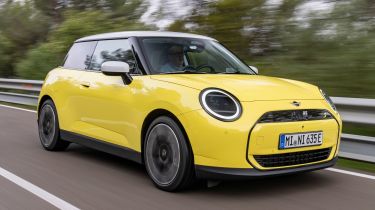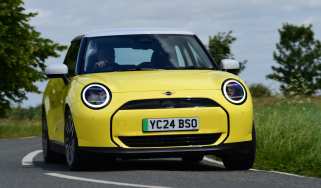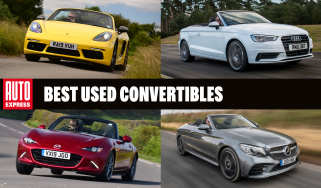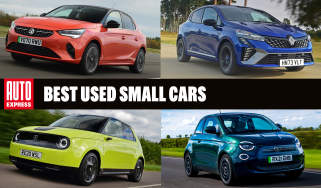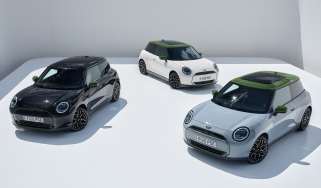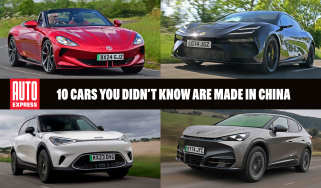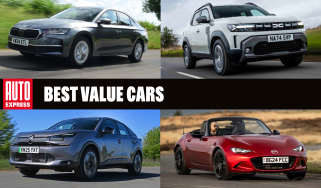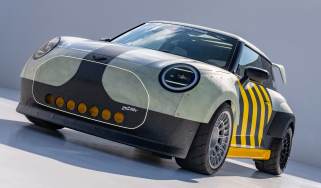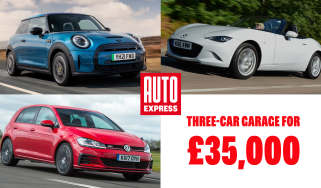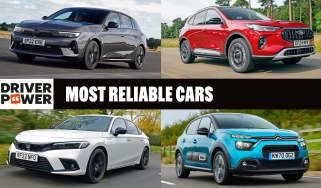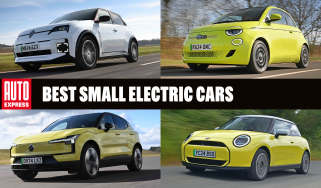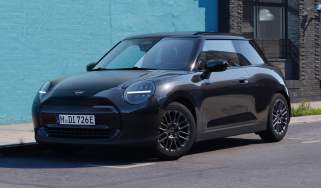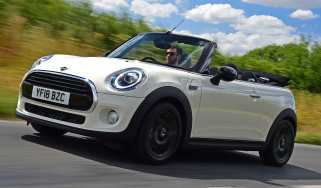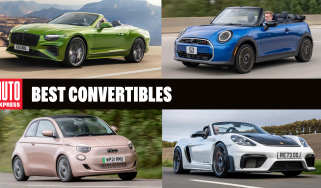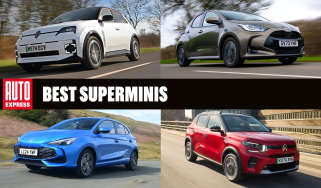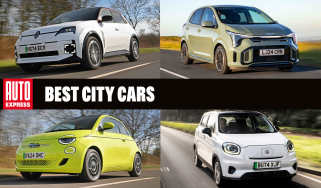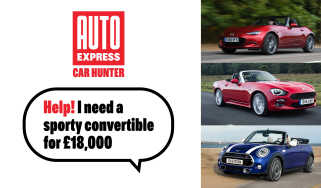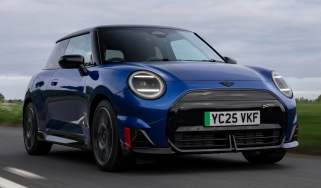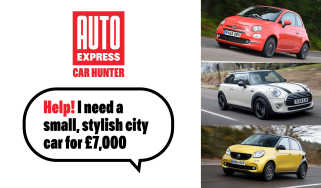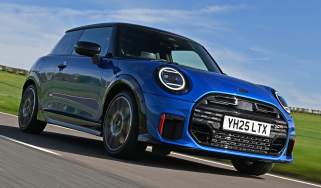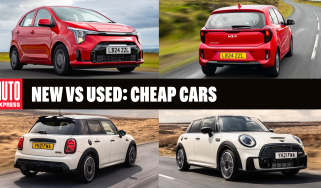MINI Cooper review: a fun and sophisticated EV
The MINI Cooper is a high-tech electric hatch that maintains a premium feel while also being fun to drive

Quick review
The MINI Cooper SE is not cheap, but it does have that air of sophisticated fun that’s made the reborn brand such a success over the past two decades. Compact dimensions and a modest battery mean that this is not a car that will win prizes for practicality or even EV range – but it oozes quality and has just enough dynamic spark to feel like a MINI. We can’t wait to try the forthcoming petrol-powered versions to see if they offer a similar experience for much less cash.
| Key specs | |
| Fuel type | Electric |
| Body style | Three-door hatchback |
| Powertrain |
40.7kWh battery (36.6kWh useable), 1x e-motor 54.2kWh battery (49.2kWh useable), 1x e-motor |
| Safety | N/A |
| Warranty | 3yrs, unlimited miles |
MINI Cooper: price, specs and rivals
MINI recently stretched the reach of its range with its largest-ever model, the new Countryman. But the company is also introducing a fresh generation of its core product, the three-door MINI Cooper – and its SUV sibling’s growth spurt puts this car under more pressure than ever to stay true to the pure ethos of the ‘modern MINI’.
The latest car, codenamed J01 in electric form, will be available with a choice of this powertrain or a combustion-engined version (F66) with 1.5-litre or 2.0-litre petrol power. But we’re restricted to just the electric car for this first taste of the final production version, after being impressed by a run in a prototype last year.
MINI tries hard to maintain the links between its modern three-door model and the original car from the sixties – probably harder than it ought to. But the latest reinvention is certainly a neat one – helped, just as the larger-than-ever Countryman was, by the addition of the MINI Aceman five-door EV into the middle of the line-up.
As such, the designers have been able to keep this three-door compact, with roughly the same footprint as the previous generation, while trimming away many of its styling add-ons and panel surfacing to create a small car that manages to mix cuteness with sophistication. Mind you, it’s still more than 20cm longer overall than an electric Fiat 500, so if your overriding priority is a tiny EV then the Italian car may be a better option.
The overall effect of the styling revamp is quite angle dependent; from the front corner the car looks short and squat, as a MINI should. But the side profile reveals how much front overhang has had to be introduced, presumably in the name of crash protection and the myriad sensors, and how lengthy the wheelbase has become to accommodate a larger battery pack.
The standard kit across the range includes a heated steering wheel, a rear-view camera, cruise control, and satellite navigation. SE models get heated front seats, LED headlights with high-beam assist, a wireless smartphone charging pad, a head-up display and anti-dazzle mirrors. Further options packs (called Levels) can bring larger wheels, a panoramic glass roof, a Harmon Kardon sound system, and electric seat adjustment.
Additionally, the car is being offered with three cosmetic-focused trim levels. Classic offers a choice of four body colours and two roof colours, plus 16-inch alloy wheels, and a couple of upholstery options. Exclusive expands the roof-colour choice to three, brings a brighter cabin finish, and beefs up the alloys to 17 inches. Sport gets its own mix of body colours, introduces high-gloss black detail elements and cord upholstery, and switches to 18-inch wheels.
Engines, performance & drive
| Model | Power | 0-62mph | Top speed |
| MINI Cooper E | 181bhp | 7.3 seconds | 99mph |
| MINI Cooper SE | 215bhp | 6.7 seconds | 106mph |
The question is, can the driving experience of this latest MINI Cooper get even remotely close to the agility and fun offered by so many petrol-powered MINIs over the past 20 years? The answer is yes, albeit with a few caveats.
So far, we’ve only driven the electric Cooper in its most potent SE form. This version has enough instant punch to overcome the car’s weight – nearly 1,700kg – making the MINI feel nippy, if not hot-hatch quick. If you happen to be running in silent mode, without any of the sound effects activated, you’ll be pleased with the refinement, too.
A three-door MINI has to handle, though, to deliver the ‘go-kart feeling’ so frequently quoted by the car’s engineers. It’s this, perhaps slightly cynical essence of ‘the classic MINI’ that’s hardest to achieve in a car carrying more than double the weight of the original icon.
And yet the MINI Cooper SE has enough agility about it to satisfy most customers. Approach a corner quickly, and the front end tucks in nicely; there’s excellent lateral grip and minimal body roll, so if you’ve enjoyed hugging the inside of a corner in your petrol-powered MINI over the years, you can do the same here. You’re never unaware of the mass involved – the laws of physics simply can’t be ignored – but equally, it’s hard to think of many EVs that are as happy to change direction as this.
We tried the car on both dry and thoroughly shiny, drenched roads, and were pleased by how effectively the Cooper SE puts down its power. In the wet conditions, stamping on the throttle did induce a bit of understeer as the front wheels started spinning, but in the vast majority of scenarios, this is a vehicle that’s comfortable with its weight and performance – and that is not an easy balance to execute.
The trade-off for this composure in corners is a slightly firm ride – to the point where we’d like to try a standard Classic car (on 16-inch wheels, rather than our test vehicle’s optional 18-inch alloys) to see how it copes with UK roads. There’s a constant patter on even smooth surfaces and we also noticed some porpoising along soaked motorways, a trait that could quickly become wearisome on longer journeys. MINIs have never been the most soothing of creations, of course, but if you’re looking for an area where it’s clear that engineers have had to compromise to accommodate the weight of a large battery, it’s right here. We’ve yet to try the less powerful Cooper E, but we suspect it could drive a little more deftly because of its smaller battery pack.
In better news, MINI has nailed the control weights; the steering is a teeny bit on the heavy side for a car that will spend a lot of its time in town, but the response around the straight ahead is reassuringly direct, and the pedal weights and progression are satisfying to use. We would like steering wheel-mounted paddles to allow you to play with the level of brake energy recuperation, though; it’d add another thin veneer of involvement as you’re squirting the Cooper SE along a back road.
Speaking of which, you may not find much pleasure in the assortment of noises that MINI offers in the cabin to make you feel more involved in what the car is doing. Selected via an ‘Experiences’ menu that also adjust the display on the central infotainment and instrument panel, they range from a classic Cooper’s engine note that graduates into a sci-fi whoosh as you accelerate in the sportiest mode, sounding like a Star Wars pod racer on the overrun.
They’re entirely synthetic, and sound it. But they do involve you – perhaps not to the same extent as a petrol engine and its exhaust note, but enough to make you aware of when you’re gunning the Cooper SE hard out of a corner, or lifting off and feeding in the brakes when approaching a hairpin. And we’d rather have them than the speaker noise of an Abarth 500e, fun though that car is.
Engines, 0-60 acceleration and top speed
There are two specs of all-electric MINI Cooper, mirroring the way the petrol vehicles are arranged. The Cooper E has a single front-mounted motor producing 181bhp and 290Nm of torque, for a 0-62mph time of 7.3 seconds. This version gets a 40.7kWh (36.6kWh useable) battery that’s good, MINI claims, for up to 190 miles of range.
The only version we’ve tried so far is the Cooper SE, which is still front-wheel drive, but its single motor produces 215bhp and 330Nm, so the 0-62mph sprint takes 6.7 seconds. The battery is larger too, at 54.2kWh (49.2kWh useable), so the range increases to as much as 250 miles depending on which spec and wheel size you’re running.
Range, charging & running costs
| Model | Battery size | Range | Insurance group |
| MINI Cooper E | 36.6kWh useable | 188.9 miles | 20E |
| MINI Cooper SE | 49.2kWh useable | 249.2 miles | 26E |
Electric range, battery life and charge time
Based on our experience with the car, the real-world range from the SE’s battery is likely to be around the 200-mile mark, which is only respectable in a car with an official figure of 250 miles.
All versions of the MINI Cooper get a standard heat pump, helping deliver more predictable distances even when the weather turns cold.
The maximum charging speed is a decidedly average 75kW for the Cooper E and 95kW for the Cooper SE, but the modest battery size ensures that a meaningful refill from 10 to 80 per cent should still take around half an hour at a suitable rapid point with both versions. Utilise a regular 7.4kW home wallbox charger, and it’ll take around six hours to fully recharge a Cooper E, and eight hours to do the same with the Cooper SE.
The charging port, meanwhile, is on the rear of the car, where the petrol filler flap would normally be. The MINI’s compact dimensions mean it shouldn’t be a problem if you park with your car’s nose closest to your home charging port, though.
Tax
The electric versions of the Cooper are likely to appeal most to company car drivers because these sit in the lowest bracket for Benefit-in-Kind (BiK) tax.
The electric Cooper is in the free road tax (VED) band because it has zero tailpipe emissions and can be driven into the London Congestion Charge zone for free. That will change in 2025, when EVs will be charged for using the road.
Our Car Tax Checker tool lets you check your tax status and renewal date in seconds. Check your VED car tax now...
Insurance groups
We won’t know the insurance group ratings for the regular petrol model until it is launched later in the year, but for now, we can say that the ratings for the electric model compare well with rivals.
The least powerful Cooper E starts in group 20, while the faster Cooper SE is in group 26. That’s a little higher than the Fiat 500 electric, which starts in group 16, but it is much better than cars like the GWM Ora 03 or MG4, which both start in group 27.
Depreciation
The desirability of the MINI badge seems to have helped with regard to residual values, because our expert data predicts that after three-years and 36,000 miles, the electric Cooper will retain between 51 to 58 per cent of its resale value. The best-performing version will be the Cooper E Classic, while the worst is the Cooper SE Exclusive.
That’s much better than the Fiat 500 electric, which has residual values of just 31 to 31 per cent over the same period, and a little better than both the MG4 (49 to 52 per cent) and the Ora 03 (51 per cent).
To get an accurate valuation on a specific model check out our free car valuation tool...
Design, interior & technology
The good news is that the MINI Cooper SE feels every bit as premium as the MINI Countryman we’ve already been impressed by. The car we tested is in the most basic of the three style-led trim levels, Classic, yet while its woven dashboard texture is admittedly a little dark and dull to look at, it does a good job of feeling nicely engineered. Other, more expensive trim levels brighten up this finish, while still retaining the quality feel.
There are soft-touch materials in many key areas, and even where there aren’t, the plastics and switches are high-grade and feel posh to the touch. This is absolutely a premium small car, just as the original modern MINI was – and feels how a premium vehicle should.
Sat-nav, stereo and infotainment
MINI’s infotainment system is a straight carry-over from the Countryman, and in general that’s a good thing. The circular OLED display in the centre of the dash measure more than nine inches in diameter; it’s crisp and clear, and judging by the speed with which it throws around graphics and zooms in and out of the map during navigation, it has a suitably grunty processor at its heart.
The interface itself can be a little fussy, and we’re less impressed that you have to prod the screen once before getting access to the temperature controls. The voice command system, complete with its personal assistant ‘Spike’, can help perform functions like this, but it takes an age compared with twiddling a physical knob left or right.
Most functions are easy enough to use once you get used to the sheer number of graphics, icons, and on-screen buttons. It also helps that the system quickly responds to your inputs.
Boot space, comfort & practicality
| Dimensions | |
| Length | 3,858mm |
| Width | 1,756mm |
| Height | 1,460mm |
| Number of seats | 4 |
| Boot space | 200 litres (seats up), 800 litres (seats down) |
The MINI Cooper will continue as the traditional three-door hatchback in the MINI range, with the forthcoming MINI Aceman, which will sit between the Cooper and the bigger MINI Countryman, fulfilling the role of the more practical five-door offering.
Certain details about the driving position remain familiar to anyone who’s driven the previous three-door hatch, such as the steeply raked windscreen that sits far forward of the driver, a low header rail, and thick A-pillars that can obstruct your view at roundabouts or when exiting junctions. The seats are wider to help with comfort, though, and the armrest is now mounted to the seat.
All versions come with LED headlights, with the option to upgrade to adaptive LED headlights with automatic high beam assistance that light up corners better at night, and take care of dipping the headlights for you to avoid dazzling oncoming traffic. To help out with parking, every Cooper comes with parking sensors and a reversing camera.
Dimensions and size
At 3,855mm long and 1,756mm wide, the MINI Cooper is significantly longer and wider than the Fiat 500 electric. It is shorter than that car (1,460mm vs 1,488mm, respectively) owing to the Cooper’s sportier bent. It is a fair deal smaller than the GWM Ora 03, but that rival does at least come with space for passengers in the back.
Seats, leg room, head room & passenger space
The MINI Cooper’s cabin is probably a bit closer to being a genuine four seater than you might expect; you can fit four adults in there. There’s quite a bit of pitch in the rear seats, admittedly, so your knees are higher and your backside lower than you’d like, but this in turn means that there’s enough headroom for six-footers.
Getting in and out is not a graceful activity, mind you – and we can see why MINI has made front passenger-seat ISOFIX points standard across the range, since it’d be a pain to extract a child from back seat berths.
Boot space
Luggage capacity has been a running joke for generations of MINI customers and the latest Cooper isn’t going to rip up the rule book in that regard. The load bay measures 210 litres when the rear seats are in place – a bigger volume, admittedly, than a 500 electric, but comfortably smaller than what you’ll get in most electric superminis, such as the Vauxhall Corsa Electric and Peugeot E-208.
Fold down the second row, and your space expands to 800 litres; it’s a special type of car that can’t manage 1,000 litres in a two-seat layout, but this is one such vehicle. It’s odd, in fact, that MINI has decided to engineer in a movable boot floor, since the gain is so marginal. A curry hook or two would have been a better addition.
Most owners will continue to hurl shopping into the rear seats anyway, of course, and if you want a more practical MINI, your dealer will no doubt point you towards the Aceman, which does have a seats-down capacity (just) in excess of 1,000 litres.
Safety & reliability
| Key standard safety features | Euro NCAP safety ratings |
|
|
The latest MINI Cooper hasn’t gone through Euro NCAP’s safety tests yet, but there’s more safety kit than ever on this generation, including the likes of automatic emergency braking, traffic-sign recognition and lane-keep assist, so we’d be optimistic about its chances of a full five-star rating. Other optional features include MINI’s Park Assistant Plus, the ability to unlock the car via a smartphone, and a remote 360-degree monitoring system that can be accessed through MINI’s own app.
It’s hard to give a reliability rating for a model that’s all new, including its powertrain and platform. But MINI customers in general seem pretty happy with their vehicles’ performance and reliability; the brand generally posts a respectable ranking in our Driver Power owner-satisfaction survey.
Warranty
While the three-year duration of the MINI’s manufacturer’s warranty is nothing special, the unlimited mileage part is at least a step on from some cars in this class. It can’t match the seven-year warranty offered by MG, though.
The battery pack has a separate eight-year or 100,000-mile warranty, which guarantees that its capacity won’t drop below 70 per cent state of charge during the warranty period. If it does, the pack will be replaced.
Should you buy a MINI Cooper?
The new MINI Cooper is an EV that somehow manages to feel like a MINI should, with a firm but composed chassis that rewards keen drivers – even if they’ll have to get used to the artificial sounds that try to improve the level of involvement. But in truth, it probably has enough of the modern icon’s DNA about it to satisfy aficionados, while offering them a considerable upgrade in cabin quality, fit and finish.
It may not be the cheapest small car, and it is certainly not the most practical – but modern MINIs have traded on fun and desirability more than these factors, and the Cooper E and SE indeed show every sign of being able to continue that.

